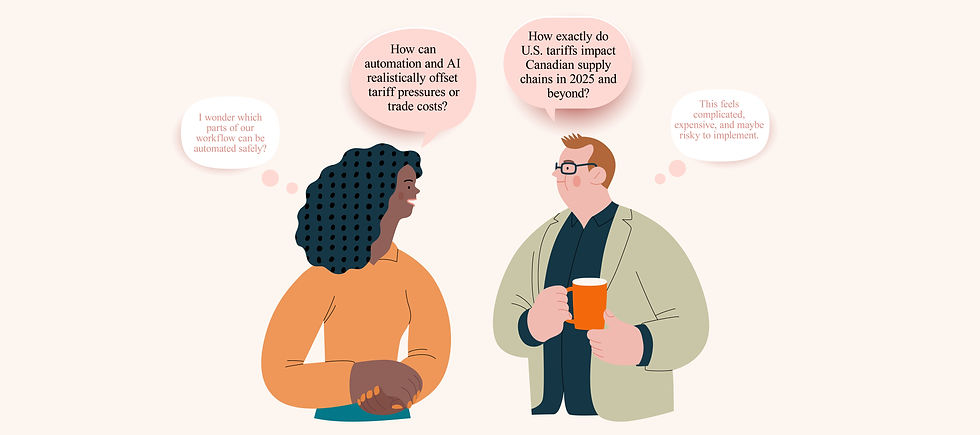Balancing Automation, AI, and Tariffs: Strategies for Canadian Supply Chain Leaders
- Gordon McLean

- Oct 16
- 3 min read

In an increasingly complex global economy, Canadian supply chain leaders are facing pressures from all directions — rising tariffs, changing trade policies, and relentless demands for greater efficiency. What once could be managed with process improvements now requires smarter, technology-driven strategies that balance innovation with adaptability.
At Focused Forward, we believe the future of supply chain resilience lies in integrating policy understanding with intelligent automation and AI — aligning operational excellence with economic awareness.
Navigating Tariffs and Trade Tensions
The impact of U.S. tariffs continues to ripple through Canadian sectors, touching everything from agriculture and manufacturing to logistics and retail. Many organizations have adjusted their operations to absorb short-term costs, but long-term sustainability requires a more strategic response.
Understanding where your supply chain is most vulnerable — and how automation can mitigate that risk — is essential. Today’s leaders need to not only manage cost pressures, but also anticipate how global policy shifts could reshape logistics, procurement, and production models overnight.
Automation and AI: The New Response Toolkit
Automation and artificial intelligence are no longer future concepts — they’re active response tools.
• Automation helps eliminate inefficiencies, reduce manual processing, and improve cross-border compliance tracking.
• AI provides predictive insights, enabling leaders to forecast demand, assess tariff impacts, and make better decisions faster.
When paired, they create supply chain agility — the ability to respond to disruption with precision, not panic.
Organizations that embrace these tools aren’t just improving operations — they’re redefining how Canadian supply chains compete on a global scale.

Cross-Border Collaboration and Optimization
The path forward demands collaboration between technology and policy. As automation platforms evolve, they can integrate data from customs, logistics systems, and compliance processes — enabling smoother border operations and better visibility across the entire supply chain.
Real-world examples show that companies embracing digital transformation in logistics and compliance are gaining measurable advantages in speed, accuracy, and adaptability.
These are the organizations that see tariffs not only as constraints but as catalysts — driving modernization and smarter decision-making.
Turning Disruption into Opportunity
The supply chain landscape is being reshaped by automation, AI, and international policy — and those who adapt quickly will lead.
At Focused Forward, we help businesses transform complexity into opportunity, combining process automation, strategic insight, and design thinking to create systems that are as agile as they are intelligent.
Join the Conversation





Comments